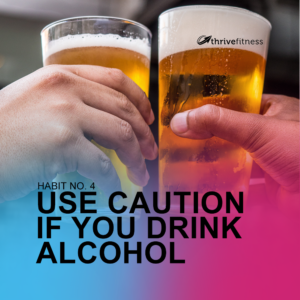No products in the cart.
Exercise, Fat loss, Fitness, Fuel your body, Goals, Men, Mindset, Motivation, Weight loss, Women
Long-life Habits (backed by science)
It’s disappointing that we can’t drink from the fabled fountain of youth, but the good news is that most of us are born with a good shot at living a long life: Only about 25 percent of age-associated disease is genetically determined. That means that our environment and lifestyle choices are much stronger predictors of how long we will live. In most cases, those are factors that we can significantly influence—and they alone could be the ticket to dancing circles around your ninetieth birthday.
Here’s your weekly long-life tip/habit to embrace. Some obvious… some, not so much:
1. EXERCISE 
People who exercise regularly live about five to seven years longer than those who are inactive. Weight-bearing exercise, such as walking, strengthens your bones. Aerobic exercise strengthens your heart. Aim for at least 30 minutes of activity on most days.

2. WATCH YOUR WEIGHT
Obesity, which is linked to heart disease, type 2 diabetes, and other health conditions, reduces life expectancy—but the greater risk of dying early isn’t limited to only those who are technically obese (defined by a body mass index, or BMI of 30 or greater). People with a BMI greater than 25 also have a higher death rate than people whose weight is in a healthy range. (Experts hypothesize that they may also engage in unhealthy behaviors, such as smoking and overeating, more often.) Talk to your doctor about what’s healthy for you—ranges vary depending on gender and height.
3. GET ENOUGH SLEEP
Getting a good night’s sleep can help reduce stress, keep your weight in a healthy range and give you energy for the day ahead. Aim for at least seven hours per night. When you sleep enough, your body repairs and regenerates its tissues and strengthens your immune system.
 4. USE CAUTION IF YOU DRINK ALCOHOL
4. USE CAUTION IF YOU DRINK ALCOHOL
While some studies have shown that moderate consumption of alcohol (one drink per day or less for women, two drinks per day or less for men) may contribute to longevity in some people, beer, wine and spirits certainly have their downsides. Beyond the health risks associated with excessive consumption of alcohol, it ranks among the top five sources of calories for adults, contributing to weight gain. If you are someone who enjoys a good glass of vino, simply make sure you’re doing so in moderation.
5. EAT WELL
Enjoying a diet that’s rich in fruits and vegetables, whole grains, low-fat dairy products, and seafood is linked with longevity. These foods deliver vitamins, minerals, and heart-healthy fats that boost health and help prevent disease.
 6. MANAGE STRESS
6. MANAGE STRESS
Chronic stress sets the stage for many health conditions. Stress probably exerts its adverse effects by triggering an inflammatory reaction of our immune system. Meditation, massage, and gentle forms of exercise like yoga, for example, can help reduce stress.
7. GET VITAMIN D
People who have higher vitamin D levels may live up to five years longer, according to a study done by researchers at King’s College in London; they concluded that the part of our chromosomes that shorten with age may not reduce as rapidly as it would if levels were lower. The best source of vitamin D is good, old-fashioned sunshine, so aims to spend 15 minutes outdoors most days. Shiitake mushrooms, fortified cereals, and oily fish like salmon and tuna are some good food sources of vitamin D, but getting it from a variety of places is essential, says Mark Liponis, M.D., Canyon Ranch physician (1994 – 2018). You can talk to your doctor about a vitamin D supplement if you think you’re low.
8. WEAR A SEAT BELT 
Seat belts save lives: More than 12,000 people survived car crashes in 2010 alone because they were wearing seat belts.
 9. FLOSS YOUR TEETH
9. FLOSS YOUR TEETH
Flossing each night can remove the bacteria that might otherwise cause inflammation in your gums. That inflammation activates your body’s inflammatory response, raising your blood pressure (among other things) and increasing your risk for heart disease and stroke. This can also potentially damage brain tissue, increasing your risk of developing diseases like Alzheimer’s.
 10. STAY CONNECTED
10. STAY CONNECTED
People with strong social networks (family, friends, clubs, and groups) live longer lives than those who are not connected to others. Researchers hypothesize that the unhealthy impact of the stress hormone cortisol is lessened when people have friends and family to lean on.
 11. DON’T SKIP CHECK-UPS
11. DON’T SKIP CHECK-UPS
Getting regular check-ups can help identify potential problems early. The earlier a condition like diabetes or high blood pressure is diagnosed and treated, the healthier you’ll be.
12. AVOID OVEREATING
The link between calorie intake and longevity currently generates a lot of interest.
Animal studies suggest that a 10–50% reduction in normal calorie intake may increase the maximum lifespan
Steve’s personal tip that has always served him well:
“Always leave the table thinking you could have eaten a little bit more.”
13. EAT MORE NUTS
Nuts are nutritional powerhouses.
They’re rich in protein, fiber, antioxidants, and beneficial plant compounds. What’s more, they’re a great source of several vitamins and minerals, such as copper, magnesium, potassium, folate, niacin, and vitamins B6 and E
So, there you go. Just some of the healthy habits that you can incorporate into your day-to-day activities to improve your chances for long life. They say there are “secrets” to living a longer life, but I say it’s really all about making just a few changes in your lifestyle. They’re right in front of you.
Men women


